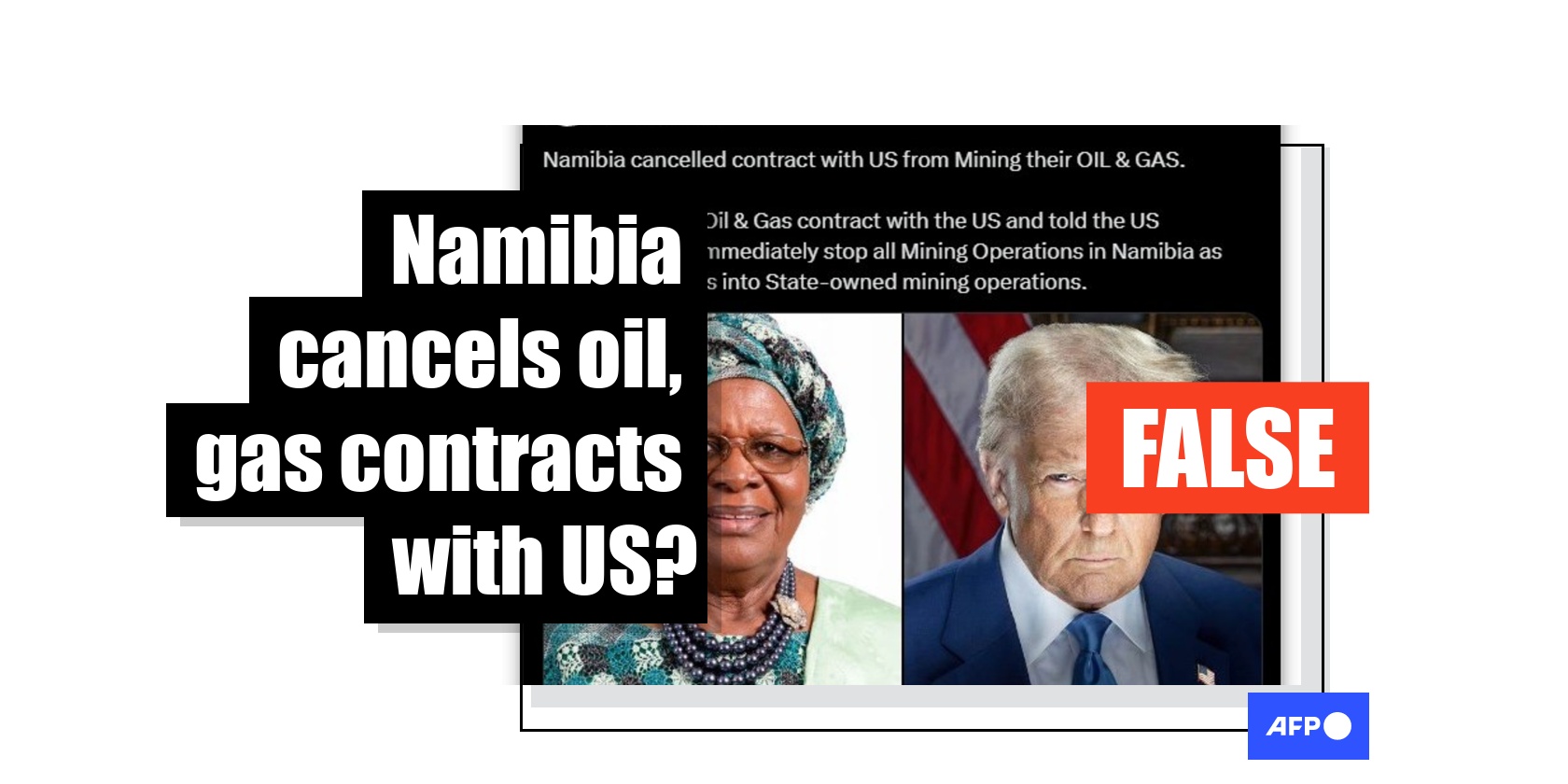
Posts falsely claim Namibia has announced ban on US gas and oil exploration
- Published on June 12, 2025 at 16:29
- 3 min read
- By Tendai DUBE, AFP South Africa
“Namibia cancelled contract with US from Mining their OIL & GAS,” reads an X post published on May 30, 2025.
With more than 16,000 likes, the post adds: “They ended the Oil & Gas contract with the US and told the US Government to immediately stop all Mining Operations in Namibia as Namibia ventures into State-owned mining operations.”

The post includes side-by-side photos of Namibia’s President Netumbo Nandi-Ndaitwah and US President Donald Trump.
Similar posts were shared thousands of times more on X and other platforms, including Facebook, TikTok and blogs.
Nandi-Ndaitwah, who was elected in March, placed the country's oil and gas industries under direct presidential control the day after her inauguration. They previously fell under the Ministry of Energy and Mines (archived here).
However, the government has not announced the cancellation of any energy contracts with the United States.
No announcements
A keyword search for “Namibia cancels oil and gas with the US” turned up more posts repeating the false claim, as well as articles debunking it (archived here).
The posts began circulating at about the same time as claims debunked by AFP Fact Check alleging that Namibia had announced the deportation of 500 Americans.
As reported by AFP in April, Nandi-Ndatiwah explained that the oil and gas sector had the potential to transform Namibia’s economy within the next five years by securing energy supplies and creating jobs (archived here).
“Mining contributes 12 percent to our gross domestic product and over 50 percent of our foreign exchange earnings. Regrettably, this figure does not reflect the true potential of mining and our mineral resources,” she was quoted as saying.
On May 30, 2025, her presidency responded to the viral posts by labelling them “fake news” (archived here).
Fake news! pic.twitter.com/nkpqjc2Vva
— Namibian Presidency (@NamPresidency) April 15, 2025
Namibia’s presidency reiterated this to AFP Fact Check on June 4, 2025.
“The Namibian government has not at any point cancelled any contracts with investors from the United States in the mining, oil and gas sectors,” said press secretary Alfredo Hengari.
He added that “it is not the policy of the government to cancel contracts that are binding”.
A US State Department spokesperson told AFP Fact Check on June 11, 2025: “The online claims that Namibia has cut off the United States from mining and gas are false.”
Foreign investment
Contrary to the claim, Namibia has become a global exploration hotspot with several international gas and oil companies actively exploring its coasts in recent years (archived here).
At the start of 2025, American firm Chevron announced that it had not found commercially viable gas in Namibia’s Orange Basin (archived here).
By April, however, the company confirmed it would continue exploration in the Walvis Basin in 2026 or 2027, where firms including TotalEnergies, Shell, and Galp have made discoveries.
Similarly, British multinational Shell deemed its Namibia oil discoveries uncommercial due to high gas levels in January.
However, France’s TotalEnergies believes it can handle these geological challenges, but its investment decision hinges on maintaining production costs below $20 per barrel (archived here).
Another American corporation, ExxonMobil, is investigating (here and here) the country’s potential in the Namibe Basin (archived here and here).
The state itself, through the National Petroleum Corporation of Namibia (NAMCOR), holds a 10 percent stake in its exploration partnership with TotalEnergies (50.5 percent), QatarEnergy (30 percent) and Impact Oil and Gas (9.5 percent) (archived here).
As a top uranium producer, Namibia also announced in April 2025 that it will launch talks this year on its first nuclear energy plant, seeking to exploit its rich natural wealth to transform its economy (archived here).
Copyright © AFP 2017-2026. Any commercial use of this content requires a subscription. Click here to find out more.
Is there content that you would like AFP to fact-check? Get in touch.
Contact us
